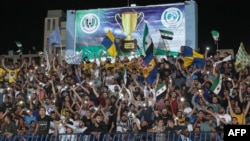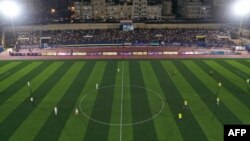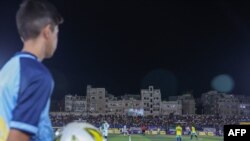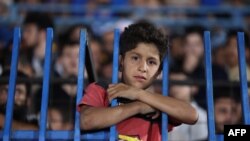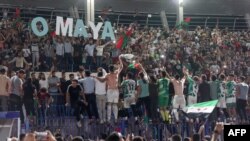Thousands of fans in Syria's last opposition bastion have packed into a stadium for the frenzied final of a football cup — an escape valve amid years of conflict and misery.
"I'm really happy today," said Mohammed al-Zeer, 28, from the northwestern city of Idlib. "Between the war and the destruction and explosions and the problems," events like a football match are "a great joy."
Syria's rebel-held Idlib region is home to about 3 million people, around half of them displaced from other parts of the country.
Many live in poverty, including in overcrowded displacement camps.
Friday night's match pitted the Omaya team from the heart of the opposition-held city against Homs Al-Adiya, composed of players originally from the regime-held city of Homs.
The stadium was packed with cheering spectators who set off flares and yelled revolutionary anti-regime slogans as well as football chants.
Supporters waved Syrian opposition flags along with the red-and-green colors of the Idlib team or the blue-and-yellow of the Homs club.
"Whenever I watch matches with a big, enthusiastic crowd, it means a lot to me," said Zeer, who is also a fan of Barcelona and Argentina's national team.
"Sport is the only outlet for young people in the Idlib region."
Syria's conflict broke out in 2011 after President Bashar al-Assad's repression of peaceful anti-government demonstrations escalated into a deadly conflict that pulled in foreign powers and global jihadis.
The war has killed more than half a million people and displaced millions more.
The tournament brought together 36 teams made up of players from the Idlib region or displaced from other parts of Syria.
The Idlib bastion is controlled by Hayat Tahrir al-Sham (HTS), considered a "terrorist" group by Damascus, as well as by the United States and the United Nations.
Idlib footballer Yazen Habboush said he used to play for Omaya when it was part of the Syrian premier league team in government-held areas.
"Some other players and I defected" in 2015, said Habboush who is now in his late twenties.
He was enthusiastic about the opportunity Friday's match provided, saying it enabled people to "express feelings" usually kept inside.
Because so many people wanted to see the match, hundreds climbed on top of walls in the stadium itself or watched from the roofs of nearby buildings.
There was a rush of excitement when the home team won 2-1, with Omaya fans invading the pitch and fireworks bursting over the stadium in celebration.
Fans of the victors then took to the streets on motorbikes and in cars, waving Omaya flags of red and green.
Idlib's municipal stadium was hit by airstrikes early in the conflict but underwent basic restoration work and reopened in 2018.
In 2020 it hosted displaced people who pitched tents around the facility, hanging their laundry on the pitch-side fence.
Mohammed al-Sibaie, a sports official with the local authorities, said further renovations were completed last November.
The stadium was at its maximum capacity of 12,000 for Friday night's game, he said.
"Sport is an outlet for everybody," whether sportspeople or not, Sibaie told AFP. "Despite the bombing and despite the hardships that the people are going through, God willing we will continue doing sport and expand on it."




